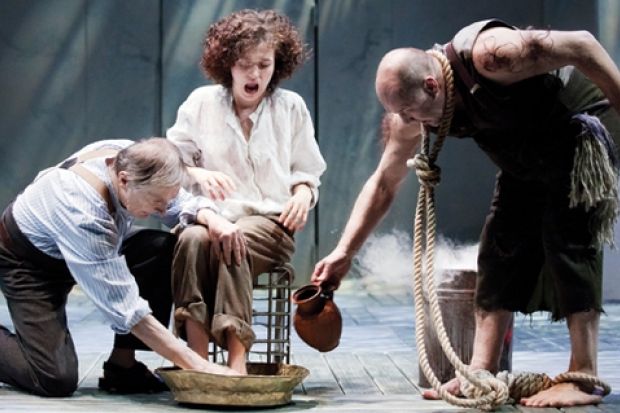The Tempest
By William Shakespeare
Directed by Declan Donnellan
A Chekhov International Festival production in association with Cheek by Jowl, with support from Thèâtre Les Gémeaux Scène Nationale, Sceaux
Until 16 April, Barbican, London; 25- May, Mossovet Theatre, Moscow, Russia; 4-5 June, Platonov Festival, Voronezh, Russia
I'm off this week to Little Rock, invited by the Arkansas Family Health Foundation, which caters not just for physical fitness but for cultural and intellectual well-being. No more jokes about the Deep South, please. While the UK coalition government is busy bulldozing the NHS and higher education, the enlightened Arkansans, on health grounds, are producing a Shakespeare play, together with a newly commissioned concert and accompanying lectures. It's what you might call a Big Society project.
The play? The Tempest, of course, and had I not seen Cheek by Jowl's Russian-language production at the Barbican, all would be well. Not since Simon Russell Beale's Ariel gobbed full in the face of Alec McCowen's avuncular Prospero, in Sam Mendes' 1993 RSC production, have I seen a Tempest as revolutionary. (The moment caused audible gasps and woefully was censored when the show moved to London.)
Thanks to Declan Donnellan, I'm in possession of 10 pages of notes about late Shakespeare, retirement to Stratford, providence and resolution, which now look distinctly jaded. Who would have thought that Miranda and Caliban were childhood sweethearts? Who'd have taken Ferdinand for a would-be rapist? Who'd have imagined that, in the final moments of the play (so full of forgiveness, according to my notes), Prospero would have to wade in to prevent the courtiers kicking Caliban to death like something from Lord of the Flies? This was not Forbidden Planet nor Prospero's Books, not a Tempest offshoot; this was the thing itself. But under the spell of Donnellan's "so potent art", this Tempest was inspiring, spectacular - a wholly "brave new world".
Nick Ormerod's set was a screen into which were set three doors. As the tempest intensified, they started to swing on their hinges until they opened to reveal the drenched and desperate mariners tugging at ropes. Downstage sat Prospero (Igor Yasulovich), clenching his fists, his face a cruel rictus - nothing effortless or benign about his magic. This eerily totemic sequence encapsulated the staging's effectiveness and simplicity. But it was in the relationship between Prospero and Anya Khalilulina's Miranda that the production quickly established its radicalism. The longest and most boring scene in the play has Prospero lecturing his daughter on their previous usurpation - he is so dull that she keeps nodding off. In this version, she slapped and bit him as she grieved for the sailors. He responded by grabbing the back of her neck and steering her towards an upturned milk crate to be seated. But as his lamentable story overcame him, she went to him and entwined herself, arms and one leg, about his body in a pathetic attempt to comfort him. He was a horrible dad - bullying, grumpy, capricious, self-interested - but she loved him.
Her relationship with Caliban (Alexander Feklistov) was similarly fresh. Usually he is a lascivious monster who has to be kept at arm's length but here, as she stripped to the waist, he came to her and lovingly bathed her feet. When Yan Ilves' predatory Ferdinand carried her, kicking and screaming, off to Naples, Caliban was left hysterically gibbering at her departure. Only a gentle hand on his head from Ariel (Andrey Kuzichev) could mollify him.
The production included some mischievous humour. The masque of Ceres cast the goddesses as rural peasants straight from the pages of a Soviet Realist novel, cheerfully distributing the plenty of the Communist state. The "sun-burned sicklemen" became slyly iconic. As Stephano and Trinculo (Sergey Koleshnya and Ilya Iliin) were distracted by Prospero's wardrobe, they found themselves in a department store, full of designer clothes and jewellery, where they eagerly succumbed to the seductions of Western capitalism, puzzling over and then mastering a credit card terminal. Chillingly, as Ariel pronounced the courtiers to be "three men of sin", he stood above, his voice austerely amplified, delivering his verdict on them in the manner of a Stalinist show trial.
In the final moments, Prospero grabbed his "perfidious" brother, and pressed to Antonio's neck his cut-throat razor. The forgiveness came, but almost as an afterthought. Donnellan's Tempest, vivid and alert throughout, teetered on the edge of tragedy, challenging established orthodoxies about this traditionally sentimental play. Interrogating Shakespeare, as they know in the Deep South, is good for your health.
Register to continue
Why register?
- Registration is free and only takes a moment
- Once registered, you can read 3 articles a month
- Sign up for our newsletter
Subscribe
Or subscribe for unlimited access to:
- Unlimited access to news, views, insights & reviews
- Digital editions
- Digital access to THE’s university and college rankings analysis
Already registered or a current subscriber? Login
